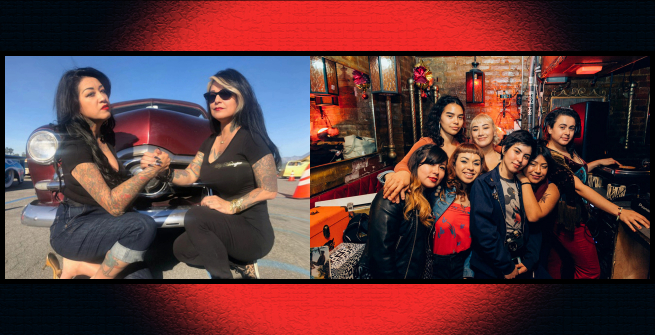The Varrio Vamps and the Chulita Vinyl Club are two very cool female-centric crews who prove that cars and records are not just for guys. Whatever your interests or activities, it can be rewarding to join a club of like-minded people who share the work and the play—or start your own.
Car culture has deep roots in Los Angeles, crisscrossed from the ocean to the desert by highways and palm tree-lined boulevards. The bold look of pre-and post-war cars, with their sweeping contours, rumbling engines, tail fins, and headlamps, has perennial appeal for collectors and gearheads. There are car clubs specializing in VW bugs, street rods, roadsters, and Model T’s, but membership has long been mostly male—until recently when all-female clubs began springing up. Along with the Lady Lowriders, the Black Widows, and the Latin Queens, Varrio Vamps are now hitting the streets in some serious Detroit rolling iron.
Lillian Romero, aka Lily Monzter, founded Varrio Vamps with her friend Julie Maldonado, aka LV. Both love punk and rockabilly and sport tattoos, dyed hair, and black attire. They grew up around family and friends with classic cars but were never encouraged to drive or work on their own, so they decided to start a club. LV’s 62 Chrysler is named Santa Muerte, with a glossy black finish and airbrushed roses on the trunk. Lily’s 56 Lincoln is matte black with a purple metal flake roof and an image of Lily Munster from the classic TV show. Wherever they drive, they inspire women to picture themselves behind the wheel of a badass muscle car.


Record collecting and DJing has long been a passion for music heads; even the ascendancy of digital music has only heightened the allure of vintage vinyl. DJ crews started getting together in the 70s and are still today a great way to swap records, spin sets with friends, network for party promotion, and pool resources for gear. But as with classic cars, club membership has long been mostly male. Crews like the Chulita Vinyl Club are changing that.
In 2014, Claudia Saenz felt disconnected from the Austin, TX., DJ scene and wanted to see more Latinas like herself behind the decks. She started the Chulita Vinyl Club (slang for ‘cutie’) to maximize fun, friendship, and representation and immediately realized she’d tapped into something underappreciated—women of color who wanted to get into DJing and throw parties their way. The club got so popular that it spread to other cities, and there are now chapters in San Antonio, San Diego, Riverside, and the Bay Area.
A few years ago, Roseli Martinez contacted Saenz and asked if she could start a Los Angeles chapter. Her friends Linda Tovar and MaryAnn Aguirre wanted to join, but they worried you couldn’t be a DJ without crates full of records and years of experience. Roseli told them to forget about that and just show up and jump in, often the best advice for getting into something new. CVC chapters are informal, all about getting together and enjoying records—although lately, they are DJing bigger stages than ever, including festivals like Primavera Sound and Desert Daze. They spin a wide range of styles, including Chicano oldies, 60s soul, Latinx punk, riot grrrl, yé-yé pop, new wave, garage, rocksteady, ska, Tejano, and cumbia.

Representation behind the decks is a major part of it: as their website states, the club is made up of women, gender non-conforming, non-binary, LGBTQ+, and self-identifying people of color, including Latinxs, Tejanxs, Chicanxs, Xicanx, Afro-Latinx, and many others. Their mission is to provide “a safe space for empowerment, togetherness and to utilize music and vinyl as a form of resistance against the erasure of culture.” And that is the other part of it: vinyl records can be a physical form of memory, history, and roots. Tovar points out that there’s a motto found on many Latin records that reads “el disco es cultura”—the record is culture. Many of the CVC DJs play records they inherited from their parents and family members; by playing them, they are helping keep the culture alive.
